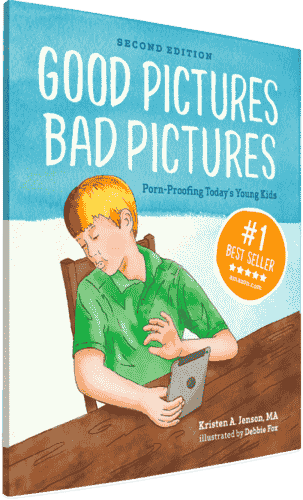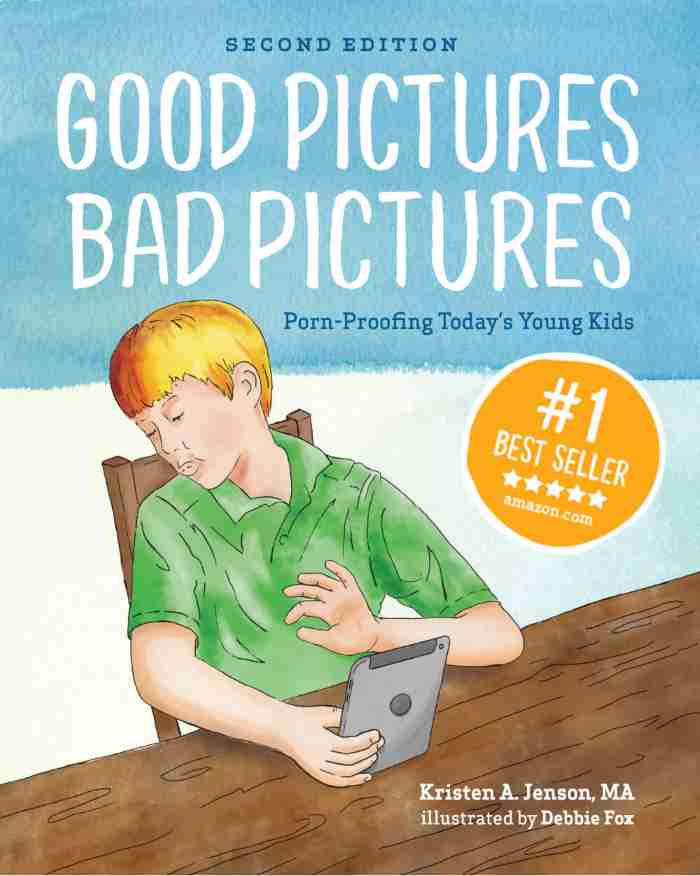
It’s Awkward, and It’s OK: You CAN Talk to Your Kids About Pornography
This article was last updated 10/15/2024.
How old was your child when you first talked with them about pornography? Our kids were eight and ten.
.jpeg)
Before this time, they understood the basics of sex and some of the dangers that lurk on the internet. We explained in general terms the “why” behind our family restrictions for media and entertainment — the movies they could watch, the music they could listen to, and what they could do on computers. And by general, I mean really general: “We do this to keep you protected from some of the bad stuff that’s on the internet. And trust us, there’s a lot of bad stuff.”
As all children do, our girls kept growing and asking grown-up questions. And we had a little extra incentive to talk to them. My husband and I had just turned in a manuscript for our book about our journey through his pornography addiction. There, on the cover, splayed out for all to see, was the word "pornography."
Though our daughters wouldn’t read our book any time soon, we knew they would see it. A clear conversation before the book made its way into our house was in order. It’s one thing to teach your kids what pornography is and how to stay safe from it. It’s another to somehow convey that the struggle is both real and personal for their own father.
You probably won’t face our unique situation of having a dining room table loaded with boxes of books with the word “pornography” on the cover, but you will need to talk to your kids about it. And, for some of you, there may come a time when you will reveal your own struggle with it as well.
Related:
- 7 Things Your Seven-Year-Old Should Know about Love and Sex
- 4 Powerful Ways Love Kills Porn—and Why Every Kid Needs to Know
The danger of waiting too long to talk to your kids about pornography
As I mentioned before, our youngest was only eight at the time. Eight years old seems young to talk about sex, much less something as difficult to explain as pornography. I totally get that. I had many fears going into this conversation:
- What if my girls become curious about sex and porn after we talk?
- What if I’m corrupting their innocence and view of the world?
- What if they see their father differently?
I’m not saying 8 years old is a magic number. It was the best for our family and circumstances. You know your child. You know a lot about their maturity level, their interests, the devices they have access to, and their online activity. But it’s also important to know that in all probability, you do not know everything. Because no parent knows everything about their child.
The other thing that is true for almost all parents: we need to talk to our kids about porn at younger ages than we probably feel comfortable doing. An interview with Fight the New Drug reports they have children as young as eight years old who have emailed them asking for help.
Since sexualized media is everywhere, we want to get the first word in about respecting and celebrating bodies, relationships, and healthy sexuality. Sooner is safer!
The good news is that there are age-appropriate ways to equip our children so they are ready to make positive choices online.
The more time they are on the internet, the more likely they will explore and run into some unseemly things (kids are naturally curious!). Consider these two facts:
1. 42% of 10-year-olds have a smartphone, and this increases to 91% by age 14.
2. Teens spend an average of 4.5 hours on their phones each day, with some averaging up to 16 hours.
Related: The Truth About Porn’s Impact on Childhood Mental Health
Tips for talking to kids about pornography
The goal here is to make a hard subject easier. Recognizing this can’t be a “one-and-done” conversation is actually a relief, because you know you will have multiple chances to get your point across and to clear up any confusion. The more you talk about it, the more comfortable everyone becomes. These tips are good for your first, or 40th, conversation!
1. Acknowledge the awkwardness
Yes, talking about sex with your kids is legitimately uncomfortable. And kids usually feel that listening to their parents talk about sex is totally weird. Pretending like everyone is comfortable (or should be) just makes the whole situation worse.
Instead, acknowledge that awkward feelings come with the conversation. Just say it like it is: “Hey, I know this is uncomfortable for all of us! But it’s important, so let’s just do our best.” Kids will learn that whatever they are feeling is okay and that emotions aren’t going to keep you from talking about challenging things together.
2. Axe the anxiety
It’s normal to be intimidated and fearful regarding pornography conversations with your kids. Pornography can be hugely triggering to people who have been sexually abused or were exposed to sexually explicit material at a young age. Or who are living with the impact of pornography in any way. It might even help to talk with a trusted friend, pastor, or counselor before you talk with your child. Your anxiety is completely valid and not something to dismiss.
As much as we try to mask our own pain and panic, our kids usually pick up on this and may absorb our feelings, taking them on themselves. Talking about the trauma you have experienced helps healing, alleviates shame, and gives you a safe place to consider the best way to approach your child.
Related: How to Talk to Kids About Porn: 7 Top Tips for Savvy Parents
3. Ask questions
We’ve seen enough sitcoms - and lived through our own childhoods - so we know that parental lectures are never as effective as we think they are. A study actually found that lectures are more than just boring. They are now scientifically proven to be ineffective.
What’s a good alternative? Asking questions. And encouraging them to ask questions. I know you’re not in a classroom with your child, but this also works across the kitchen table or in the car.
Side note: Talking about difficult or potentially embarrassing subjects in the car alleviates the pressure of eye contact, which can make everyone just a tad more comfortable and willing to engage.
Asking questions also sets the tone that we all get to participate and share thoughts.
What’s great about asking questions is that it helps you tailor the conversation. You can let their responses guide how much detail you need to share with them.
If you’re caught off-guard, it’s perfectly acceptable to say, “That’s a great question! Let me think about that and I promise to get back to you.” Just make sure you do actually get back to them.
Here are some possible questions to consider asking, depending on your child’s age:
- Have you ever hopped on your phone/computer looking for something, but something else like pornography popped up?
- What are some good things you could do to be safe if you saw pornography?
- What have you heard other kids say about pornography?
- What is the most confusing thing about pornography to you?
- What are some reasons why you think it would be best to stay away from pornography?
- Why do you think some kids would be curious about pornography?
- What are some different ways or places we might run into pornography?
- What's the best way for us to help when you see pornography?
- Since the last time we talked, have you seen anything like what we’ve been talking about?
What if your child stays silent and doesn’t want to talk? Be patient, they will get more comfortable over time if you keep trying. You could bring up things they might be thinking, such as, “I know many kids are curious about . . .” or “When I was a child I wondered if . . .”
Though it may be the very last thing you want to do, it can be helpful to share your experiences when you were a kid in an age-appropriate way. Young people need to know they’re not the only ones who have encountered it. Isolation only breeds more secrets, while connection builds authentic relationships. We model authenticity by sharing from our own lives.
Another easy way to talk to kids is to read a book together that tells what pornography is, why it is dangerous, and what they can do if they see it! These two read-aloud picture books can really open up a safe conversation that will continue as they grow. Good Pictures Bad Pictures: Porn-Proofing Today's Young Kids (2nd Edition) is for ages 7-12 and Good Pictures Bad Pictures Jr.: A Simple Plan to Protect Young Minds is just right for ages 3-6.


Good Pictures Bad Pictures
"I really like the no-shame approach the author takes. It's so much more than just 'don't watch or look at porn.' It gave my children a real understanding about the brain and its natural response to pornography, how it can affect you if you look at it, and how to be prepared when you do come across it (since, let's face it... it's gonna happen at some point)." -Amazon Review by D.O.
4. Abandon shame
One of the key ingredients in authentic relationships is trust. Oftentimes when I am afraid for my kids’ safety, my fear steps in and rules the relationship. If I think they are hiding something from me or they have done something wrong, I begin to make assumptions that quickly turn into accusations. My accusations then start to come out in shaming words. And I lose their trust.
Keep in mind that it’s not just the words that induce shame, but the tone. If I say, “Did you look at porn?” in a kind voice, with a concerned look on my face, that communicates something very different than if I ask the same question while yelling, hands on my hips, with a look of scorn or exasperation.
For so long, I thought of my girls as extensions of myself. Their behavior, I thought, was a reflection of my parenting. In essence, if they were well-behaved that meant I was good. If they were poorly behaved, it meant I was bad. But my children are not a mirror of me. It is difficult to show compassion towards them when I am so concerned about how they make me look. That just sets me up to be angry instead of compassionate.
Related: Mom Guilt? 8 Tips to Overcome Shame When Your Child Sees Porn
Talking to our kids so they are prepared to reject pornography is worth overcoming the awkwardness and anxiety that go along with it. By having these conversations, you are building a solid relationship with them based on trust and respect. This will lay a foundation for them so they know they can come to you with anything, anytime, anywhere. And they will be better prepared to face the challenges of our hypersexualized culture because you taught them well!
.jpg)







